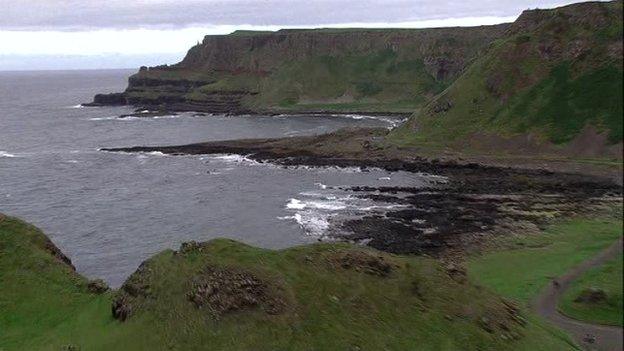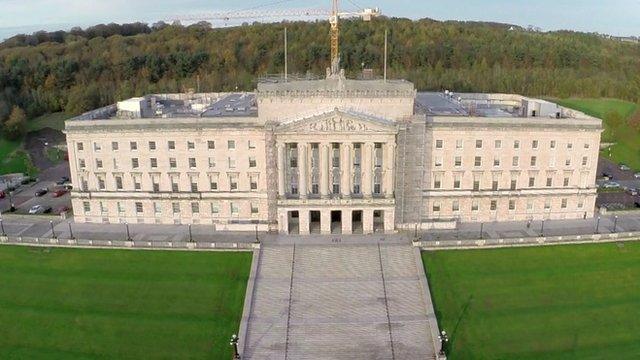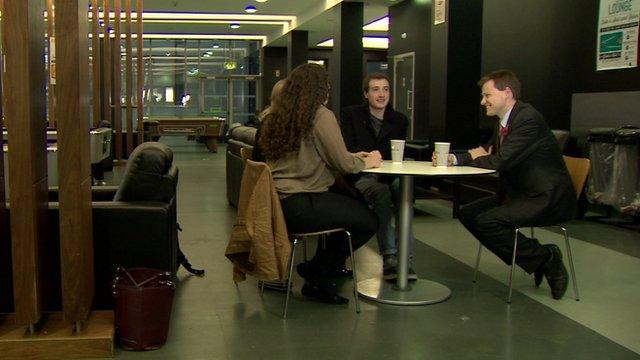Devolution: the pathway ahead for Northern Ireland
- Published

According to local folklore, the legendary giant Finn McCool built the causeway as a path of stepping stones, so he could walk across the sea to Scotland
The Giant's Causeway is, according to myths and legends, the remains of a pathway built across the sea between Ireland and Britain.
However, in political terms the divide between the islands could be growing with talk of further powers being given to Northern Ireland.
Many people take visitors to the world heritage site to show off the causeway's unique stones being battered by the waves.
But few seemed as proud of the politicians that have been known to batter each other in debates at Stormont.
Many visitors to the north Antrim site talked about politicians being "juvenile" and being involved in "playground politics".
"They squabble too much, can't agree on anything and it disheartens the whole community", was the conclusion of one woman.
Working better?
Disagreements are nothing new in Northern Ireland but recent rows have at times threatened the very future of Stormont itself.
Assembly members have been among those who have talked of a looming crisis and budget negotiations have really tested relationships.
Can the troubled Northern Ireland Assembly handle more devolved powers?
After the final result of Scotland's independence referendum was known in September, Prime Minister David Cameron spoke of greater devolution for each of the nations across the United Kingdom.
In his speech outside Downing Street he promised new powers for Scotland and Wales and made a rather more basic pledge to people in Northern Ireland.
"In Northern Ireland we must work to ensure the devolved institutions function effectively," Mr Cameron stated.
Coping with new powers
That was a pretty stark acknowledgement of the problems at Stormont.
And that has led many to ask whether the politicians in the power-sharing executive could really cope if new responsibilities were handed to them from Westminster.
Powers over welfare have so far not been devolved in Scotland or Wales but they have in Northern Ireland, and it is an issue that has caused severe political problems.
Sinn Féin and the SDLP, which are the two main nationalist parties, have blocked introducing welfare reform measures.
The Westminster government says Northern Ireland needs to pay for the money that would be saved and, as a result, Stormont is being charged tens of millions of pounds in financial penalties.
That means spending across government departments has had to be reduced and caused an even greater divide between the Democratic Unionist Party (DUP) and Sinn Féin - and the two biggest parties in the assembly are uneasy allies at the best of times.
An imperfect peace
The current Stormont institutions were set up as a result of the Good Friday Agreement which helped bring an end to decades of violence in Northern Ireland.
It is easy to forget how much has changed since then.
The DUP would not even speak to Sinn Féin when the deal was agreed in 1998.
Now they work alongside each other in the same power-sharing government.
However, in reality they have little choice.
All of the parties are entitled to ministers in the Northern Ireland Executive if they win enough seats in the assembly, creating what is known as a mandatory coalition.
Divided politics
There are currently five parties forced together in that government and they do not agree on a whole range of subjects. That has led to political deadlock on more than one occasion.
QUB students debate Northern Ireland's future position within the UK
"Northern Ireland politics is divided into unionists and nationalists and republicans," says Cathy Corbett, who is a Young Unionist at Queen's University in Belfast.
"If you compromise, you are seen as letting your side down that will reflect badly on your vote in electoral terms.
"And I really don't feel that is right for Northern Ireland."
A united Ireland?
There was a recent student referendum held on the topic of a united Ireland at the university.
Ms Corbett led the campaign against it while Oisín Hassan was at the forefront of those students encouraging a yes vote.
Although themselves divided on basic political principles, the pair are united in doubting whether further devolution is a good idea.
"We could not cope at the minute with extra powers," says Mr Hassan, who is a member of Sinn Féin at Queen's University.
"But I think we should be very proud that Stormont exists.
"We have come out of a very difficult past... It has to improve though."
The student referendum was narrowly defeated, and all recent polls about more general opinion suggest that the Irish border will remain firmly in place for the foreseeable future.
As a republican, Mr Hassan said he believes there will eventually be a united Ireland but even he adds the disclaimer "if I live long enough".
Any alternative?
That does leave a question - is there really any alternative to Stormont?
There is certainly no equivalent to the independence debate that Scotland had earlier this year.
That is probably not surprising, given that Northern Ireland's economy is simply not strong enough to stand alone.
However, it goes beyond that to a simple matter of identity. The majority of the population regard themselves as either British or Irish.
There is an obvious reliance on the UK and Irish governments to help out in a crisis.
They are both involved in the all-party talks that are currently trying to sort out, among other things, disputes over parading, the flying of flags, welfare reform and how to deal with the past. The full list is much longer and seems only to be growing.
And of course direct rule from Westminster remains the back-up plan should Stormont collapse.
Big decisions
"Northern Ireland is best placed wherever it can make the big decisions about what impacts it the most," insists Julia Andrade-Roche who is an American student attending Queen's University.
She is studying for a PhD examining the issue of the Northern Irish identity.
"Whether that means stronger devolution and a reformed Stormont or whether that means going with the Republic of Ireland, I don't care," she added.
"But I do think Northern Ireland does need to have more say in its budget."
It is worth noting, however, that some of the most recent deadlocks at Stormont have been as a result of disagreements about budgets.
The devolution debate elsewhere in the UK will lead to politicians pushing for powers over taxes and a range of other issues.
But in Northern Ireland many feel the focus should remain on making devolution work.
- Published2 November 2014

- Published2 November 2014
